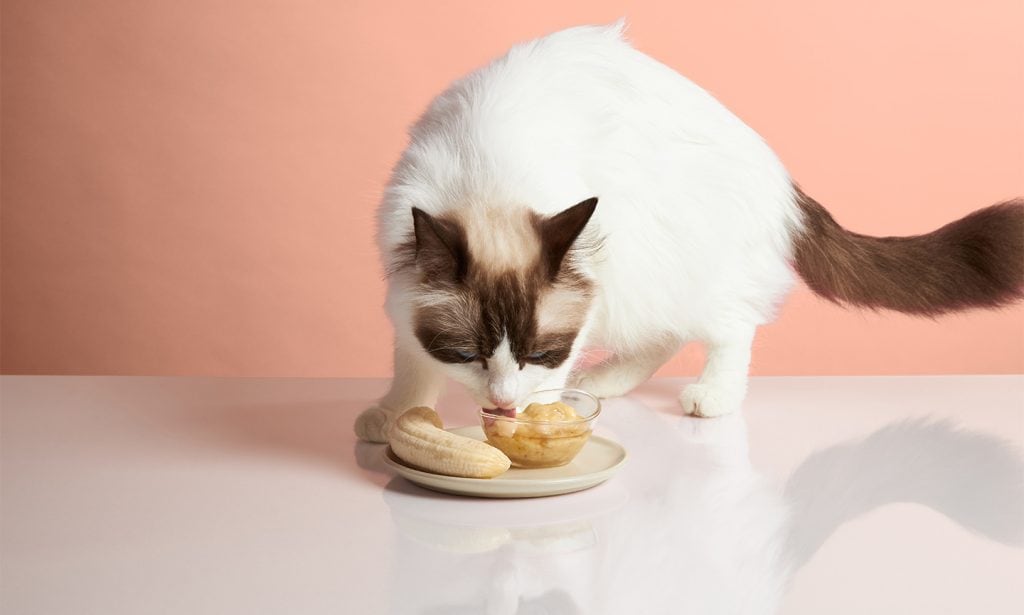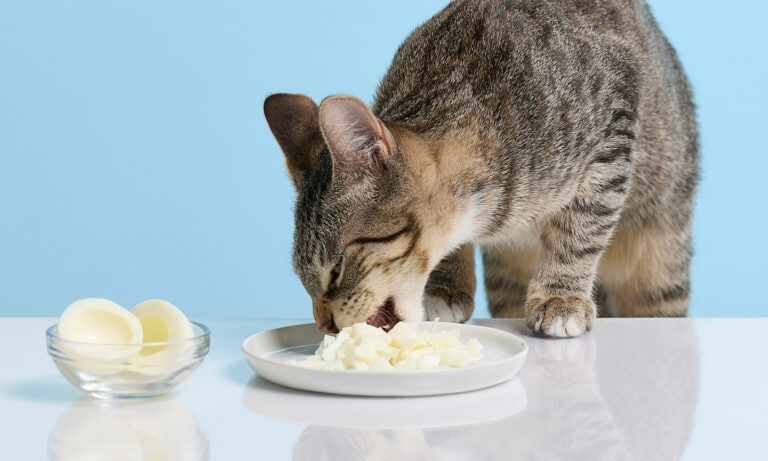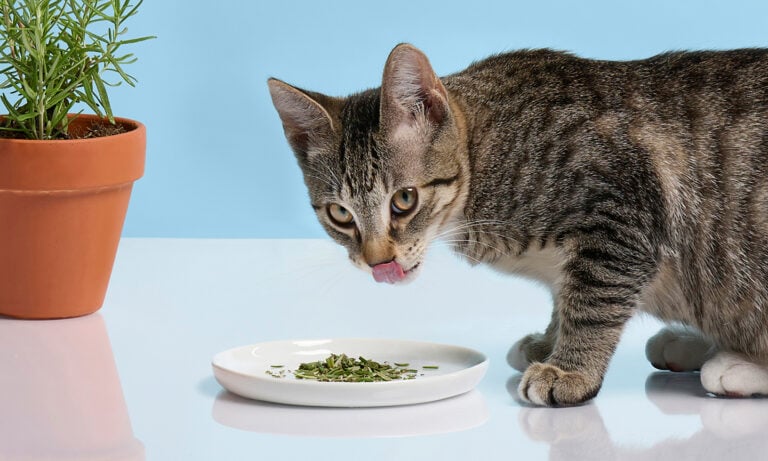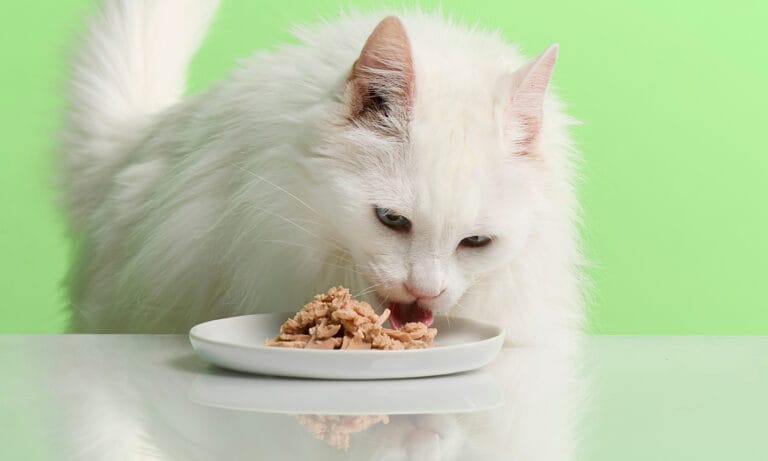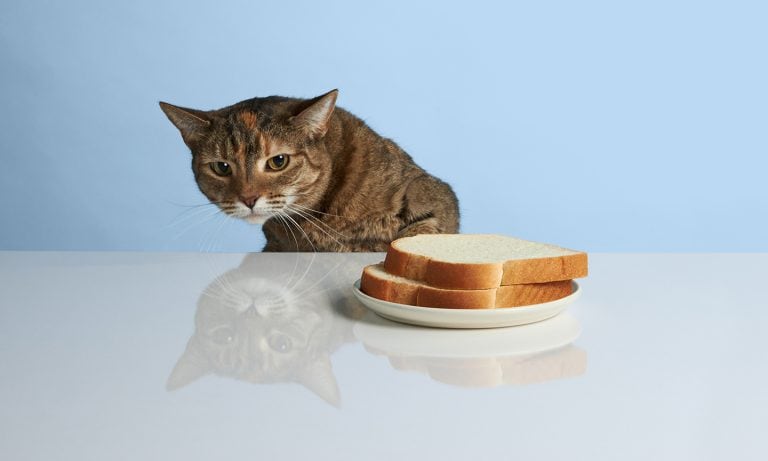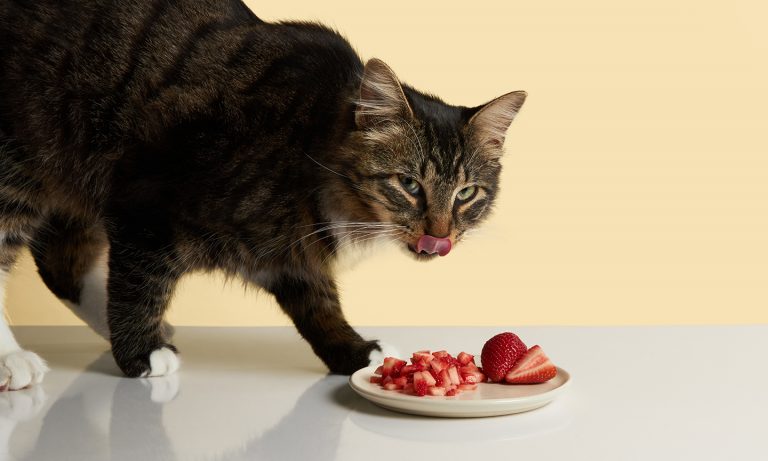You might love bananas, but can your cat eat bananas, too? In short, yes, they can in moderation. But the better question might be: Will cats want to eat them? (Spoiler alert: Probably not!)
Here’s the low-down on what you need to know about cats and bananas, including health benefits and any downsides of feeding bananas to cats. Plus, we spoke to Dr. Deborah Bayazit, DVM, co-owner and medical director of Brilliant Veterinary Care in New York City, who gave us some tips and advice on how to include bananas in your cat’s diet, answered pet parents’ pressing questions about cats and bananas, and more.
Let's Dig In:
Benefits of Feeding Cats Bananas
We’ve established that cats can eat bananas, but how much can they have in one sitting? And what are the health benefits of bananas for cats?
“A healthy cat can eat small quantities (about an inch) of bananas as an occasional treat,” Dr. Bayazit says, adding that total treats should make up no more than 10 percent of your cat’s daily calorie intake. Talk to your vet about your kitty’s daily calorie needs, and try this handy calorie calculator from the Pet Nutrition Alliance.
As for benefits, they include being high in potassium and being a good source of soluble fiber. Here’s the full list:
- Bananas are high in potassium, which supports heart and kidney function.
- They’re a good source of soluble fiber, vitamin C, and vitamin B6.
- Bananas provide glucose, which cats need for energy.
- They’re a nontoxic and all-natural treat.
- Bananas can be a unique treat and a somewhat healthy snack for cats with no medical issues, as long as they aren’t given frequently.
- Cats may enjoy the taste and be thrilled with the chance to try something other than their regular cat food.
So, not only are bananas safe for cats, but they provide some health benefits, too.
Downsides of Feeding Cats Bananas
While bananas are certainly not toxic, there’s a reason bananas should only be fed in small portions.
Cats, unlike dogs, are obligate carnivores, meaning they’ve evolved to rely solely on meat to survive. What’s more, their digestive system is not super great at handling plant food sources, and they actually have no requirement for carbohydrates in their diets. That said, if your cat has health issues (diabetes, for instance), feeding them too many sugary carbs could lead to problems.
Here are some of the downsides related to cats and bananas:
- Cats aren’t always tolerant of new foods in their diet, and unlike dogs, they tend to not like sweet treats, Dr. Bayazit says.
- Bananas could cause digestive issues, like pancreatitis, diarrhea, constipation, vomiting, and regurgitation, in certain cats.
- Because of their high sugar content, if overdone, bananas can be bad news for a cat’s health, especially if they have issues such as heart disease, liver problems, diabetes, or obesity.
How to Feed Bananas to Cats
This might be the trickiest part of the process: actually getting your cat to eat bananas, because as Dr. Bayazit puts it, “Cats are not very fruit-motivated.”
As all cat moms and dads know, our feline pals are super-picky eaters. So, there’s a fairly good chance your pet will not want to try even the tiniest taste of a banana—no matter how excitingly you might present it.
However, should your cat be interested, Dr. Bayazit has a few tips on the best ways to serve the fruit. But before you do, it’s always a good idea to consult with your veterinarian before serving your pet any new foods. The vet can determine the right portion size for your pet and weigh in on any health issues that might preclude a cat having bananas. Even occasional treats, like bananas, should be factored into your cat’s optimum daily balanced diet.
That said, here are Dr. Bayazit’s tips for feeding your cat bananas:
- For starters, remove the peel. Banana peels can’t be properly digested by cats.
- Cut the banana into a bite-sized portion (about an inch or less).
- Offer just a small piece–about the size of a blueberry–every once in a while, provided your vet hasn’t advised otherwise.
- Doling out no more than one to two chunks (about an inch of banana) at a time.
- Again, make sure total treats, including a small piece of a banana snack, never exceed 10 percent of your cat’s daily caloric intake.
- And finally, keep an eye on your pet in case there are any unusual reactions.
But Wait! I Have More Questions…
Q: Can kittens eat bananas?
A: Once kittens are weaned—typically at eight or so weeks—and ready to move on to food, they should only be given good-caliber kitten food with plenty of nutrients, like protein, calcium, and magnesium. Treats, like bananas, can be introduced after your kitten reaches 1 year. Dr. Bayazit cautions that you don’t really want young kitties to get overly fond of sweet things.
Q: What happens if a cat eats a banana?
A: A healthy cat should be just fine after partaking of a few nibbles. They may even come back meowing for more. But all cats are different and tolerate new foods in their own unique ways.
A more sensitive feline, or one with a medical condition, may wind up with upset stomach, diarrhea, constipation, vomiting or regurgitation. If given sugary treats too often or given bananas in large amounts, it could result in weight gain and too much blood sugar, which could lead to diabetes.
“If you notice anything like [an upset stomach], discontinue the treat, and contact your vet,” Dr. Bayazit says.
Q: Why does my cat love bananas?
A: While all cats are different, some may really develop a taste for human foods, like bananas. If your little love is especially drawn to bananas, a small piece every so often is purr-fectly reasonable (as long as your cat is in good shape!).
Q: What other fruits can cats eat? Can cats eat watermelon, for example?
A: Cats can eat a wide variety of fruits (in addition to their cat food, of course), including:
- Apples and pears (peeled and without seeds)
- Berries such as blueberries, raspberries, cranberries, and blackberries
- Strawberries
- Seedless watermelon
- Mangos
- Pineapples
- Apricots
- Honeydew
- Nectarines
Q: What fruits are unsafe or toxic to cats?
A: There are certain fruits that you should never include in your cat’s diet, as they are considered unsafe for cats and could lead to negative reactions. Those fruits include:
- Citrus fruits such as oranges, tangerines, lemons, grapefruit and limes
- Cherries
- Unripe tomatoes
- Grapes
- Raisins
- Avocados
If your furry friend ingests any of these unsafe human foods, contact your vet or an emergency vet clinic right away to determine treatment.
What foods can cats eat?
Share:
